
The Free Press

In 2016, Shelle Lichti voted for Donald Trump. She got tons of blowback from other gay people who thought she’d betrayed them.
She was 45 at the time, and she’d been doing things her own way since she was 11, since she was adopted by the big Mennonite family in Missouri, and ran away, and came out, and became a trucker, hauling beef and pork across the American hinterland in a rainbow-painted eighteen-wheeler.
It had been tough being a woman. And a lesbian.
But she’d forged a new life for herself.
She had built a portable home in the back of her truck—with the kitchenette, the curtains, the warm little lights, the generator, and her bed on the lower bunk, and all her clothes, first-aid gear, and dry goods in the top bunk—and she’d traversed an array of politics and religions. (She was into Buddhism—the calm, the focus. “I choose to say I have faith, but I’m not religious,” Lichti said.) She liked to listen to audiobooks—she was into Nora Roberts, the romance novelist—and she loved to turn up Sia when she was “laying down some miles,” which meant going for hours and hours, not stopping, pushing on to wherever she was going.

What she had learned from riding around the country in her little home in her big rig was you never knew as much as you thought you did about other people. “Everybody is on their own ride,” she said. “We have to respect that.”
Over the years, she noticed the homophobia had waned, but it had gotten harder to make a living, mostly because of the influx of truckers, most of whom were from Somalia and the Middle East.
“I don’t have a problem with them—they’re out here making a living for their families,” Lichti said. But with the new truckers, it was harder to get a raise. “When I started”—in 1993—“I made 19 cents a mile. Now, I barely make double that.”
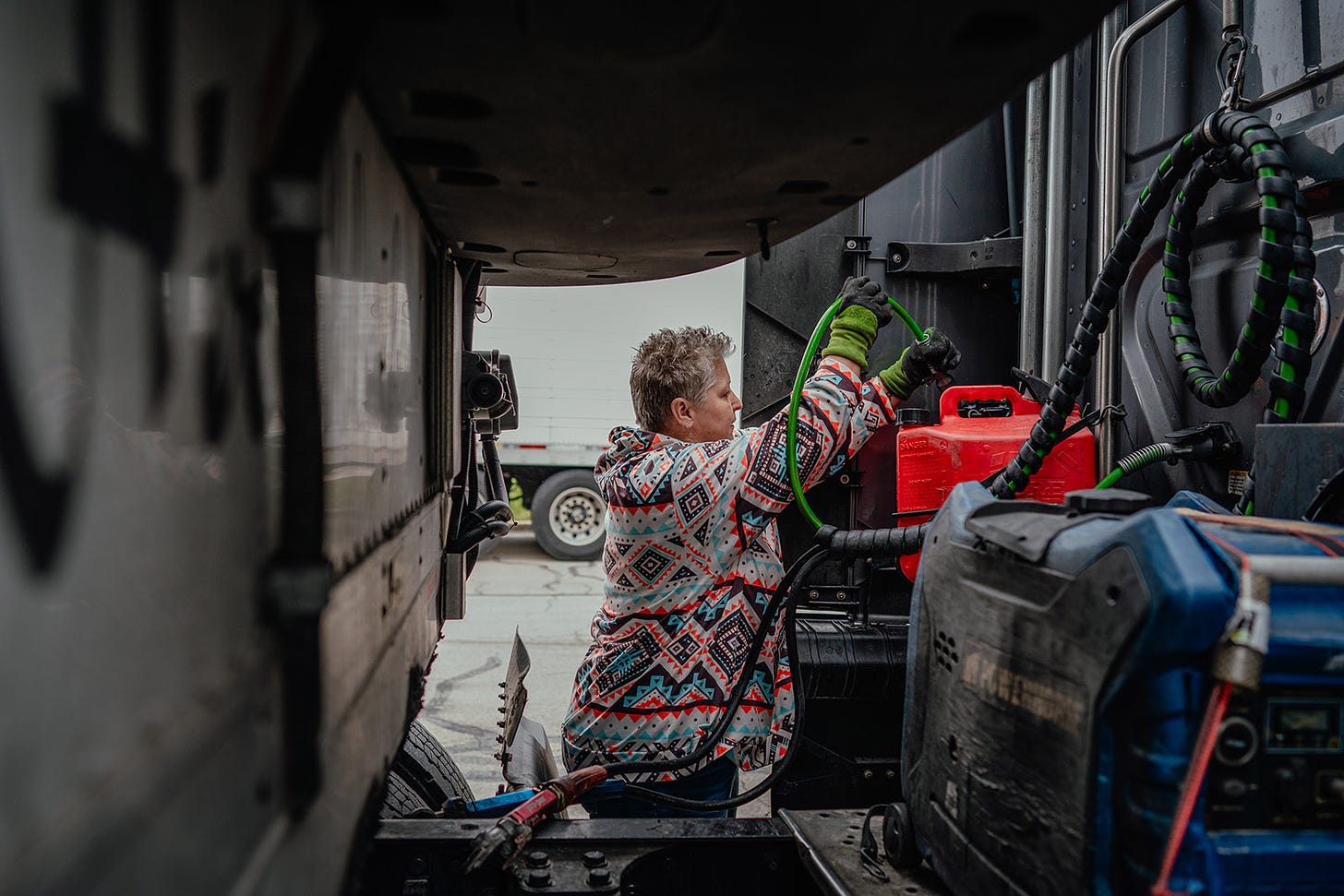
It wasn’t just Lichti who was struggling. It seemed to her like the country was falling apart. “A lot of roadside motels and hotels look like crack houses,” she said. “Not enough people coming through.” On top of that, she said, Main Streets everywhere had been devoured by Walmart, Costco, Amazon. “The billboards on Route 66”—the 2,500-mile highway connecting Chicago and Los Angeles—“are mostly gone.”
Then, in June 2015, Trump announced his presidential bid, and the bluster, the fireworks, the who-gives-a-fuck about sticking to your talking points—that was refreshing in the face of all the decline.
A lot of her gay and lesbian friends thought she’d gone crazy. “I was like, ‘If you want to unfriend me because of my beliefs, then you’re no better than the people that hate on us,’ ” Lichti said.
But after Trump got into office, Lichti started to see the world differently yet again. Trump seemed too nasty in his rhetoric, like a “toddler,” she said.
Then, she learned her son was transgender, and it seemed like a dangerous time to be trans or Muslim or Mexican. “My son’s own twin brother has blown him off,” she said.
Then came Covid, George Floyd, the riots. And Trump didn’t seem to make life any better for truckers, Lichti said. “It got even worse.”
By Election Day 2020, she said, “I wanted anybody but Trump.” Lichti voted for Joe Biden.
More than three years later, she doesn’t know what to believe. She says she feels unmoored. She considers Biden a “seat-filler.” She doesn’t care for Democrats. She kind of cares about climate change, and she’s pro-choice, and she’s heartbroken about the people dying in Ukraine and Gaza, but she doesn’t think it’s America’s problem, and she can’t stand the kids in the LGBTQ+ movement with their “20 zillion acronyms.”
She said she isn’t a “conservative” or “progressive,” and definitely not a Democrat or Republican.
“Our society has made it to where we’re supposed to fit in a certain mold,” she said. “A lot of us, you know, well, it’s like taking a plus-size girl and trying to squeeze me into a size 2. Just not gonna work.”
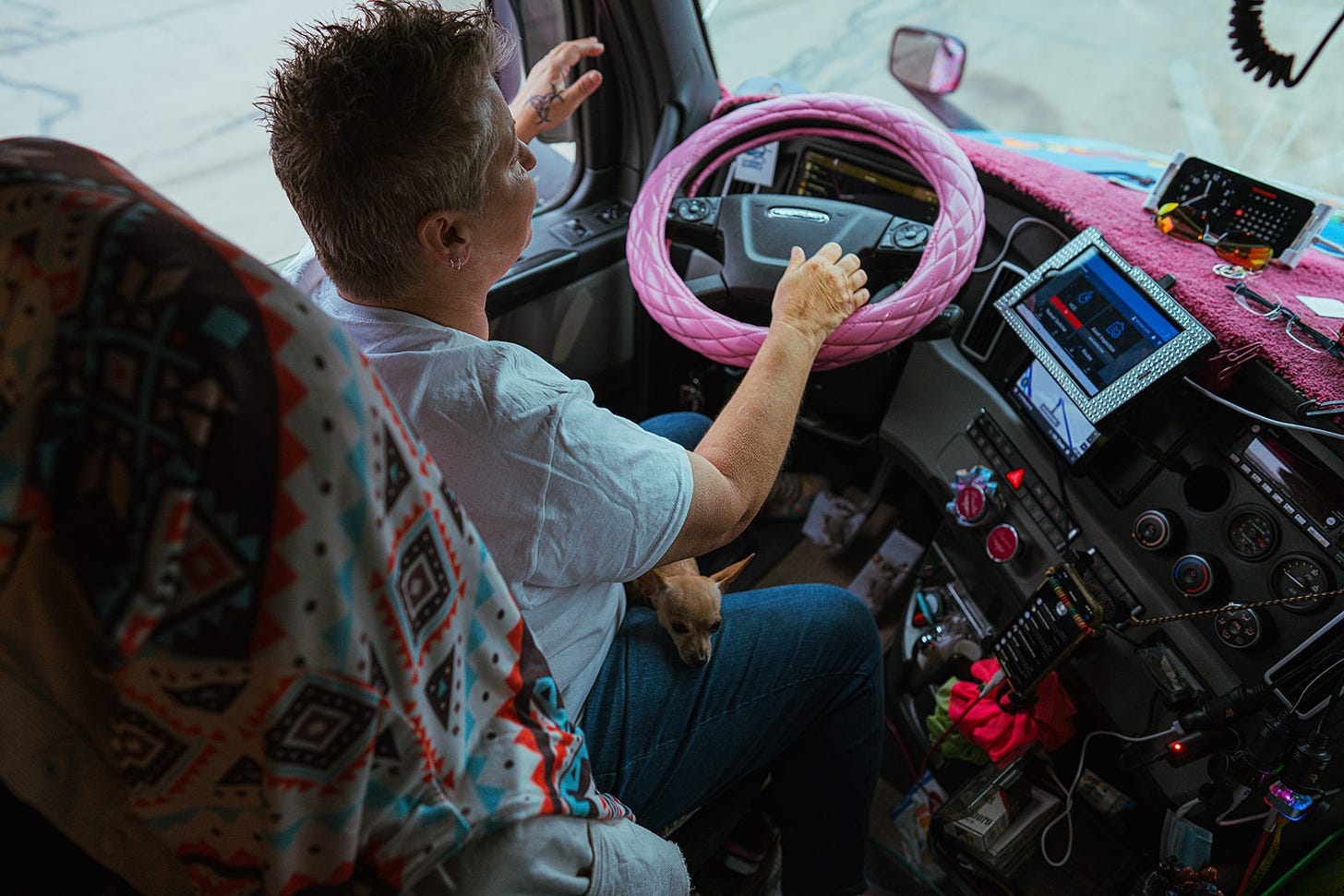
Shelle Lichti is hardly alone.
Nearly half of Americans now identify as independent—not necessarily because they’re centrists, or moderates, but because neither party reflects their views.
That’s because, over the past several decades, the parties have switched places, leaving tens of millions of voters unsure about what they stand for or where they belong, Yuval Levin, a senior fellow at the American Enterprise Institute and the author of A Time to Build, about reviving the American Dream, told me.
Levin described two axes in American political life—one right-left, and the other insider-outsider. Traditionally, the party of the right has been the party of the inside—the establishment—and the left has fought for those on the outside—the poor, the disenfranchised.
“But in the twenty-first century, they’ve switched sides,” he said. “Democrats are the elites, and Republicans feel like they’re fighting the establishment.”
One way to think about it, said Michael Lind, author of The New Class War: Saving Democracy from the Managerial Elite, was geographic: “From Lincoln to Reagan, New England, the Upper Midwest and the Great Lakes, and the western states were the Republicans, and now they’re the Democrats—while the interior was all the Democrats, and now they’re the Republicans.”
This switch has “created a huge amount of confusion, because it’s happened without either party recognizing it,” Levin added. “Republicans have gotten pretty comfortable with it, while Democrats are very uncomfortable being the insider party.”
That’s because it’s “political suicide” to acknowledge you’re the party of the elite, Thomas Edsall, a New York Times columnist who has reported on national politics for a half-century, told me.
“Democrats are elite, but they can’t say it,” Edsall said.
Consider that, in 2016, the median home price of a Hillary Clinton voter was $640,000, while that of a Trump voter was $474,000. In 2018, Democrats took control of the 10 wealthiest congressional districts in the country—all of them on the coasts, mostly in New York and California. Of the top 50, they held 41.
And, increasingly, Democrats recruit their future leaders—their ideas—from a handful of universities that cater to the American elite.
From 2004 to 2016, 20 percent of all Democratic campaign staffers came from seven universities: Harvard, Stanford, New York University, Berkeley, Georgetown, Columbia, and Yale. By contrast, the University of Texas, Austin; Ohio State University; and University of Wisconsin–Madison provided the most Republican staffers.
The reasons for the Great Scramble are legion and stretch back decades, if not longer: the breakup of the Democrats’ New Deal coalition, the end of the Cold War, globalization, the internet, the decline of organized religion and the two-parent family, the forever wars, the opioid and fentanyl crises.
“Things are definitely in flux,” Michael Lind said.
What I know for sure is that I first glimpsed it on Election Night 2022, at a “victory party” in Phoenix for Republican gubernatorial candidate Kari Lake.
Lake’s supporters seemed to fall outside the old left-right construct. Racially, economically, ideologically—they didn’t fit the preconceived categories.
My surprise was obvious when I interviewed a Latina in her fifties in an Iron Maiden t-shirt.
How was it, I asked, that she supported a candidate who had run against more Latinos coming to America? Had she not seen Lake’s campaign manager’s “racist tweet” a few weeks before?
That’s when she started lecturing me about “gangbangers coming here” and then “Big Tech” and “Big Pharma,” but also her friend’s biracial daughter and Martin Luther King Jr., and why Washington should “pump trillions” into the rural parts of the country decimated by fentanyl and cheap overseas labor.
Our conversation wasn’t that dissimilar to a conversation I had several months later with a Democratic bundler in Brentwood—he’s worth, I’m told, about $400 million—who was going on about how “the climate and AI are everything” (he thought the former was the end of us, and the latter was our salvation), and how he was “scared shitless about the gender stuff.” When I asked him whether he’d be supporting Biden in 2024, he said, “Of course,” but then he added, “As for the other fucktards”—he meant younger, more progressive, down-ballot Democrats—“no way, no can do.”
There were other weird signs: the Democratic poll, in November, showing that the base of the party—including blacks, Latinos, college women, and millennials—prefers Trump to Biden; GOP presidential hopeful Nikki Haley saying government shouldn’t bar minors from transitioning; Senator John Fetterman, once lionized by progressives, insisting “I’m not a progressive,” while touting his support for Israel and calling for tougher border controls—prompting Helen Qiu, a Republican who ran unsuccessfully for New York City Council, to call Fetterman a “Christmas Miracle.”
Compounding our confusions about the Great Scramble is the language we use to talk about politics—to describe the country we want to live in.
“Our language is impoverished, left over from the French Revolution, with us just saying ‘right’ and ‘left’ and what we think we mean by that,” Oklahoma City attorney Jason Reese, who has spent 25 years in GOP politics, told me.
In the 1980s, when he was a kid, Reese was a Reagan Republican. He believed in capitalism, and thought the Soviet Union was evil, and the unions, like liberals and high taxes, were a relic. His mom called him “Alex P. Keaton,” after the Family Ties character.
But in 1992, just as conservatives were triumphing over everyone—with the USSR now dead, and China and India embracing market economics, and the Democrats, under Bill Clinton, morphing into moderate Republicans—the movement suffered its first shock. So did Reese.
“Ross Perot was the catalyst for this,” he said, referring to the third-party candidate blamed by many Republicans for President George H.W. Bush’s loss to Clinton. “He broke up that old Republican coalition.”
It was Perot who suggested there was a contradiction baked into Reagan’s GOP: while the party embraced free trade and free markets, he argued those policies threatened working-class voters who had recently flocked to it.
Perot was especially upset about the North American Free Trade Agreement, which, he said, would lead to a “giant sucking sound going south”—as blue-collar jobs moved from the United States to Mexico.
That proved prophetic.
Reese saw the political shift happen in his own extended family, in Kentucky and Texas. In the early 1990s, he said, they cared a lot about abortion. By the 2010s, they were talking nonstop about jobs and immigration.
That colored his own thinking. Today, Reese said, he’s an “economic nationalist” who backs tariffs and a higher minimum wage, and a “foreign policy realist” (meaning, no more wars unless they must be fought), and he’s skeptical of capital punishment.
This confusion also extends to the left, which includes “liberals” and “progressives” and people who believe in minimizing economic disparity and people who think talking about economic disparity is racist.
Obama was the “perfect distillation of liberalism,” Tyler Harper, a comparative literature professor at Bates College who has written on politics and identity, and supported Bernie Sanders’ presidential bid, told me.
“Progressives,” Harper said, are the people who think racial identity reigns supreme and have no serious objection to capitalism.
“I don’t think they’re left-wing in any substantive sense at all,” Harper said of progressives. He saw progressivism and “corporatism” as “natural allies.”
Exhibit A: the $8 billion U.S. companies spend yearly on DEI training.
“We desperately need a new vocabulary,” he said.
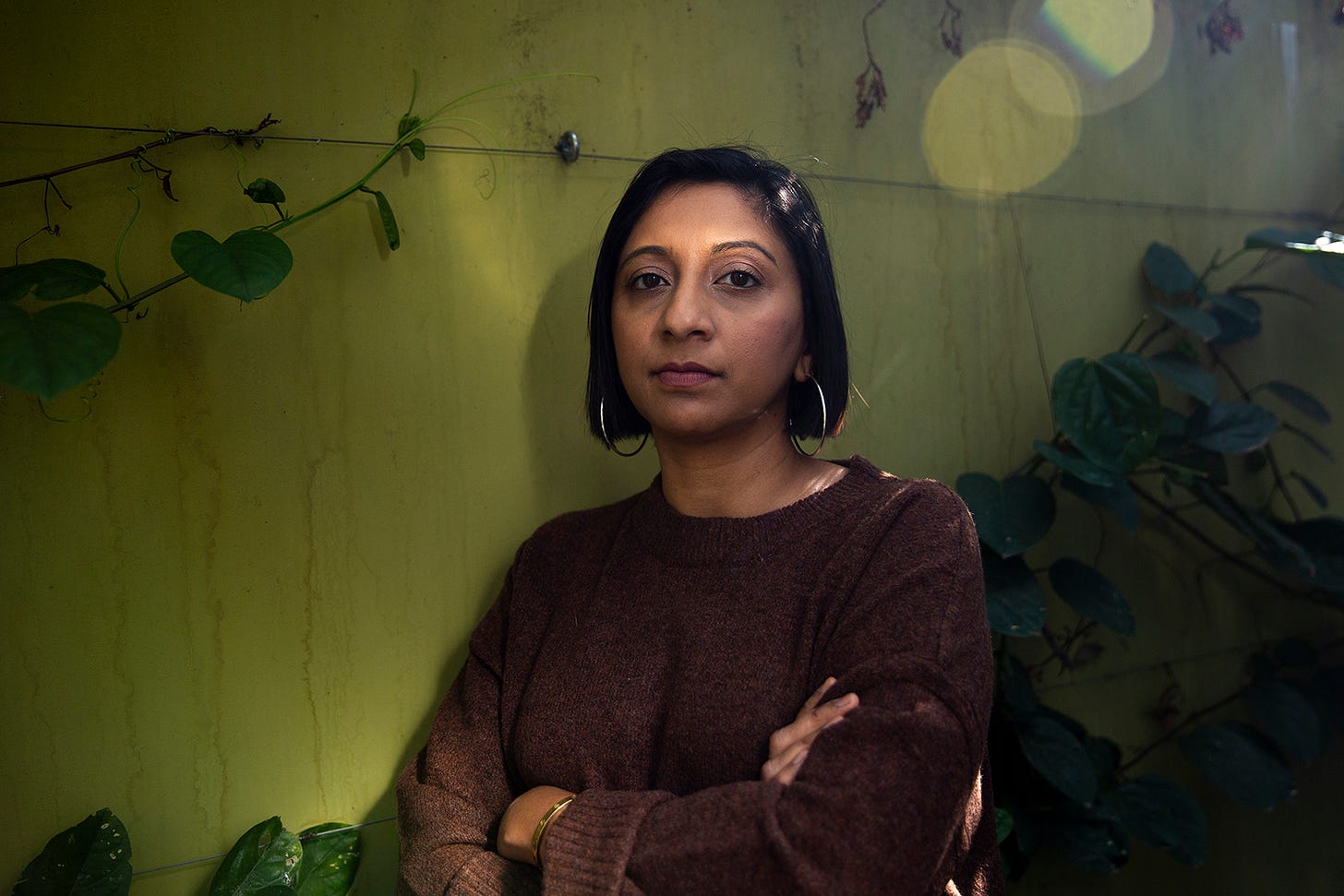
That is how Priyanka Wolan feels—unsure of how to describe herself or what she believes.
She had immigrated to the United States from India with her family when she was eight, and she had always leaned Democratic.
It’s not that she doesn’t know what she believes. She is definitely pro-choice, but she also wants to curb “unauthorized immigration.” She thinks the new gender politics is insane, but she believes strongly in defending civil liberties. And she’s giving her four daughters a traditional homeschool education that includes Latin and classical music.
The trouble is that all of these things do not fit together into one party or camp or label.
We were having dinner at the house in the hills of Los Angeles that she and her husband, Alan, share with their daughters. My 9-year-old and hers had become friends in an after-school math program.
“The present-day conservative movement doesn’t align with my life experience in the way I used to think the Democratic platform did, but the Democratic Party no longer aligns with that either,” Wolan said.
“The first time I realized I wasn’t on the left was when I started homeschooling, and people were like, ‘This isn’t supporting public education, what’s wrong with public education?’ ” she said. “That’s when I started to see, ‘Oh, I’m not falling into line.’ ”
But then, in 2019, she started to feel the tug of identity politics, and it was like a whirlpool. She and Alan, who is Jewish and 18 years older, had always been “sparring partners.” Now, it felt more personal, as if she, a “brown woman,” were facing off against whiteness and the patriarchy.
During the summer of 2020, “it became really difficult for us to have a conversation,” she said. He thought defunding the police was idiotic, and worried about illegal immigration and crime. “I remember saying at one point,” she continued, “ ‘You know what, let’s not talk politics. You’re never going to understand me, because you’re white, a man, privileged’—all the jargon.”
She added: “At one point, I remember my dad saying, ‘You’re not doing a service to yourself or your kids when you’re constantly thinking in terms of your identity. We didn’t come to America for you to think this way.’ ”
It was other moms who made her rethink things, albeit unwittingly. They didn’t approve of what she was teaching her girls: Shakespeare, Charles Dickens, the poetry of Robert Frost, Mozart sonatas.
“At the height of the decolonization narrative, people would say, ‘Why are you teaching them this? This is the Western canon,’ ” Wolan, 42, said. She was surprised. She wanted her daughters, as she said, to “have it all”—the most rigorous liberal-arts education that would not only get them into a top college but enable them to think critically.
It wasn’t that her views had changed. She mostly believed in the same things she always had. “I’m liberal in the old sense of the word—the not believing whatever you’re told to believe,” Wolan said.
When I asked Wolan whether it was hard being politically homeless, whether it would be easier to join one of the available tribes, she half-smiled and said it wasn’t so tough fending off criticisms of homeschooling or deciding who to vote for. (She can’t vote for Biden again; she’d probably vote for Vivek Ramaswamy, if he wins the GOP nomination.) The hard thing was getting comfortable with people knowing her husband supported a candidate who everyone she knew thought was evil.
“I didn’t want people knowing he was for Trump,” Wolan said of Alan. “It took me a while to get to the point where I thought, ‘You know what, he’s allowed to have whatever opinions he wants.’ ”
Brian Lasher, a retired Navy commander and high-school history teacher in Erie, Pennsylvania, could not care less whether people know he plans to vote for Trump. Not that he’s excited about it. He thinks Trump’s “an asshole.”
But he has to vote—he hasn’t missed an election since he first voted, in 1980—and he doesn’t believe in voting for protest candidates. He wants his vote to count. (In 1992, he voted for Ross Perot. “That’s a vote I regret,” Lasher said. “Clinton is the best Democratic president of my lifetime.”)
His father came from a family of Calvin Coolidge Republicans—“He refused to have an FDR dime in his pocket”—and his mother was religious and liberal.
He was raised Lutheran, and he is pro-life, but he thinks there need to be exceptions, and he is worried about inflation, and he thinks we have to stop illegal immigration—“human trafficking is grotesque”—but he supports legal immigration—“some of the best students I’ve had were immigrants”—and it is obvious the poles are warming, but it is also obvious we shouldn’t do away with oil and gas. “That’s just suicidal,” Lasher, 62, told me.
During the lockdowns, he’d watched his students disappear into their screens. The school couldn’t make them turn on their cameras, so almost all turned them off. Usually, he had no idea whether they were even there.
Anyway, the “institutional rot” was everywhere, he said, and everything that came out of D.C. reflected as much—not only the Covid protocols and deficit spending, but Russiagate, which he called “bullshit,” and the corruption. He meant the Clinton emails, the Hunter Biden pay-to-play thing, all of it.
If it looks like Robert F. Kennedy Jr., now running for the White House as an independent, might win Pennsylvania, he’ll vote for him.
But generally he’s pessimistic about things. “We’re seeing extremes in both parties drive America toward an abyss,” Lasher said.
He recalled Christmas 2007. He was in Baghdad with the Navy, and he was at dinner in the mess hall at Saddam Hussein’s old Republican Guard Palace, and General David Petraeus’s chief chaplain was talking about the new “religious reconciliation initiative.”
Lasher was asked to be the chaplain’s note-taker, and the two of them spent the next six months hopscotching around Baghdad meeting Shiite and Sunni religious leaders talking about why they hated each other, and what could be done to stem the violence.
“We were at the house of a sheik, he was a Shiite, and he was explaining the differences between the Iranian Shiites and the Iraqi Shiites.” The sheik said he was going to Iran in three weeks, and he asked, “Is there some message you want me to deliver to the Iranians?”
After a moment, Lasher recalls saying, “I told him to tell the Iranians that our symbol is the American eagle. In its talon are either arrows or the olive branch. The choice is theirs. ‘Those who live by the sword, die by the sword.’ He responded, ‘Yes! Yes! This is what I have been preaching all my life. I will tell them this.’ ”
Later, after Iraq, after he came home, after the polarization and anger in America seemed to billow out of control, he would often remember that night in Baghdad, the competing forces.
“We have far more that brings us together than separates us,” he said.
Sometimes that’s hard to remember. He wants to be hopeful. He’s a big fan of Catherine Bowen’s Miracle at Philadelphia: The Story of the Constitutional Convention. George Washington’s “Farewell Address” is his favorite speech.
But those stories, those pieces of the sacred American past, feel far away. People no longer listen to each other, he said. “We’ve tuned each other out.” It’s like everyone is shouting into a Tower of Babel, unaware of who they’re shouting at, or what they’re angry about.
“A lot of that, I fault the media for,” he said. “They’re not being honest about the people they report on.”
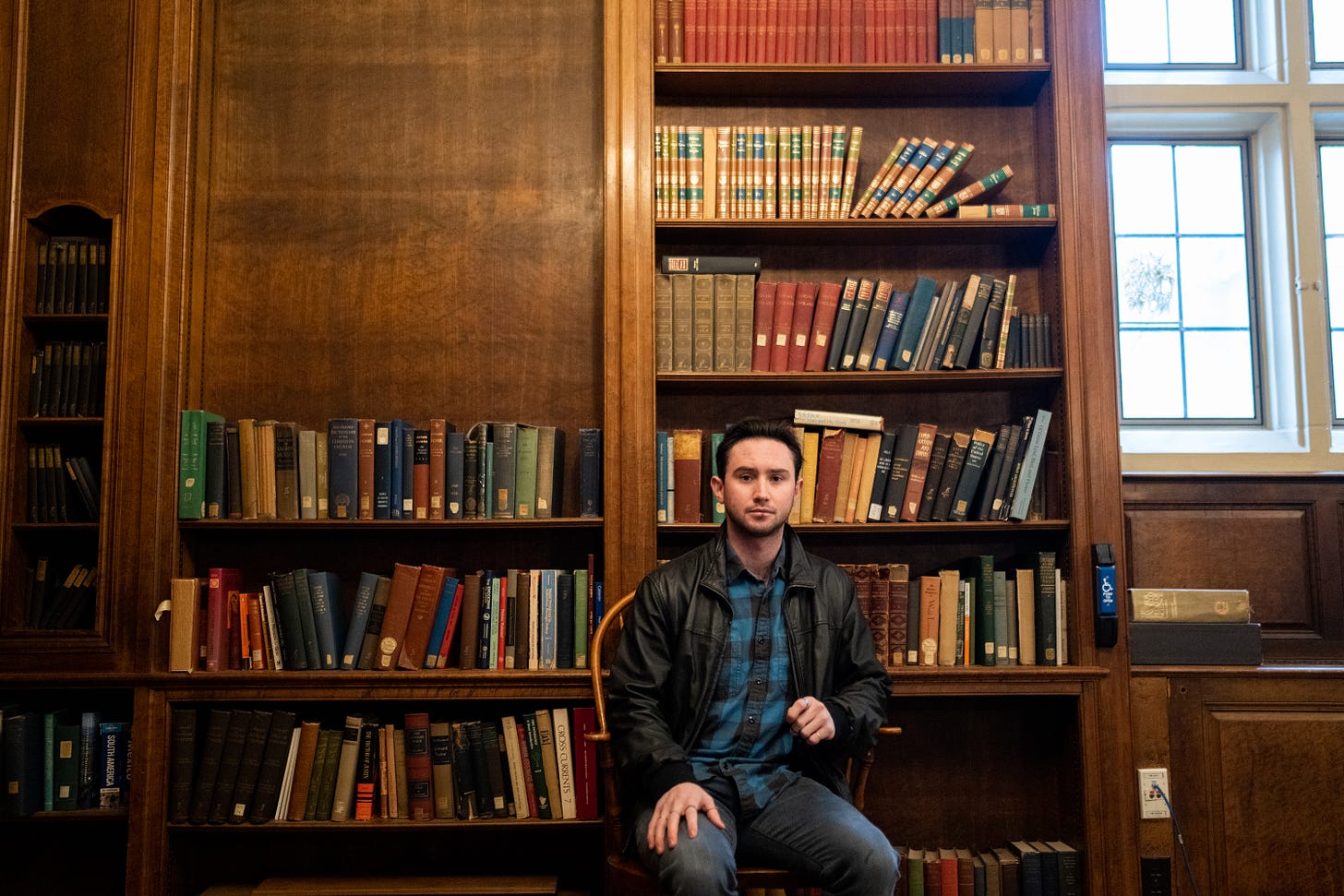
Rory Fleming, a 23-year-old senior at Yale, agreed that no one really knows who they’re screaming at.
“Ever since 2016, it’s been like whiplash,” he told me.
In 2016, he was in high school, and he knew a lot of kids from Guatemala and Venezuela and Paraguay, and he understood why they felt targeted. He found Trump noxious.
But then he got to Yale, which “has been the opposite experience,” Fleming said. “It’s pushed me to the right.”
The big thing was Covid, the lockdowns, how the university went all in with masking and shutting down campus life.
For Fleming, just like Shelle Lichti, everything came into focus in the summer of 2020. That was when the upside-downness revealed itself.
“I really felt that for the first time in July 2020, when my friend and I took this 45-day, cross-country road trip,” he said. “New York was shut down, and I remember getting to North Dakota, where there were ‘no mask’ signs everywhere. They were reacting against what they felt was authoritarianism, and they weren’t wrong. There was something about the Democratic reaction that was authoritarian.”

Post-whiplash, it was hard to know where he belonged.
Fleming believes the government should be spearheading the “green revolution”—starting with renewable projects in places like West Virginia—and he is pro-choice, and pro-civil liberties, and he thinks the United States needs to be strong. “That was something I did respect about Trump’s presidency,” Fleming said. “He carried a big stick. We shouldn’t have Houthi rebels with drones firing missiles in the Red Sea. Terrorists should fear the United States, and I don’t think they are right now.”
He recalled his semester abroad, in Dublin, and being at a pub with friends, all foreigners, and someone making fun of the United States. “I remember saying, ‘You don’t know how lucky you are that it’s us, and not China or Russia running the world,” he said.
No one argued with that.
What’s confusing, Fleming said, is that so many Americans don’t get this.
Lichti agrees.
“Politics is so confusing right now,” she said. “The people that stay in their camps, that pretend or don’t know it’s not confusing—they’re the ones who are really confused. For me, saying you’re confused is being honest.”
Peter Savodnik is a writer and editor for The Free Press. Read his last article, “I Was Wrong About John Fetterman,” and follow him on X (formerly Twitter) @petersavodnik. Kiran Sampath contributed reporting to this article.
And if you want to support more deep political reporting from The Free Press this election year, become a subscriber today:

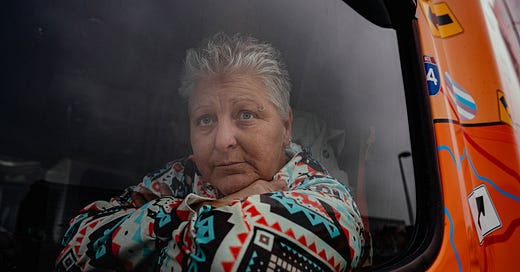







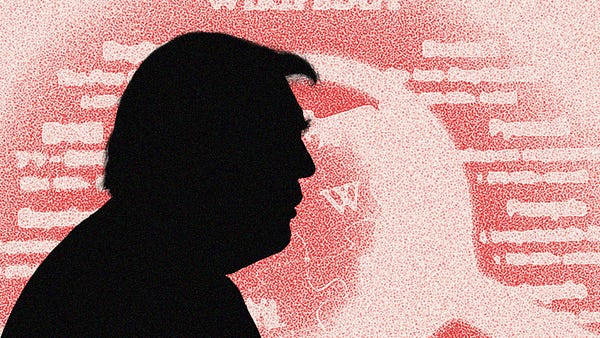

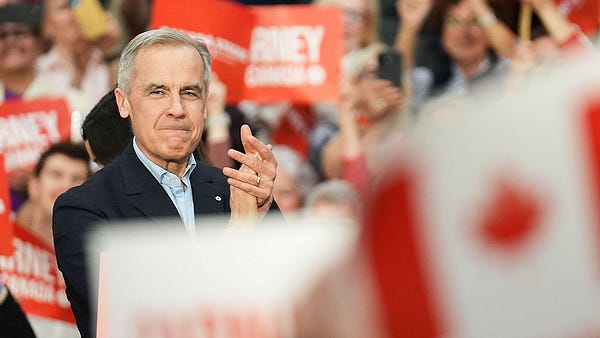

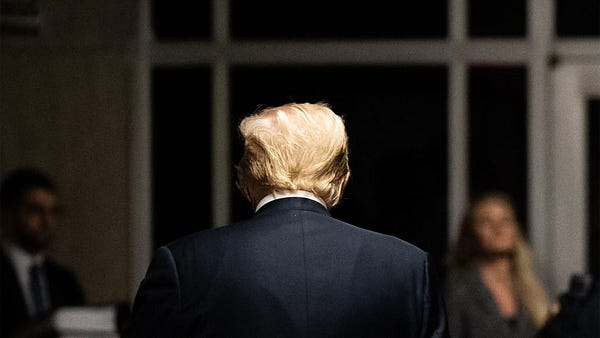

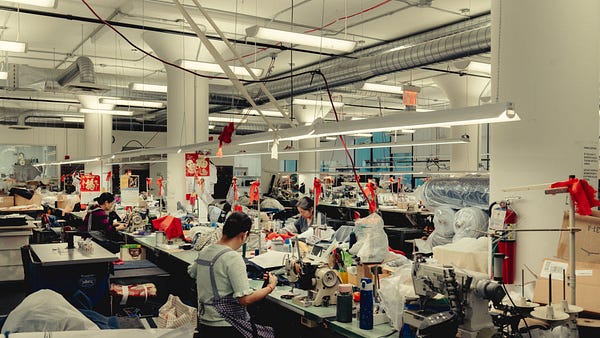

Very enlightening! Love hearing from everyday Americans across the country.
The controlling forces of the two major parties, "woke" left (D) and religious right (R) impose exclusionary tests on their leadership and nominees. How do we Independents, who can't even vote in some primaries, substantially effect policies without enduring the accompanying baggage mandated by the party supporting our position on an individual issue?